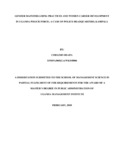| dc.description.abstract | This study sought to investigate the extent to which Gender Mainstreaming Practices affect Women
Career Development in the Uganda Police Force (UPF). The study was guided by two specific
research objectives namely: investigating how Human Resource Polices affect women career
development; and examining the extent to which Affirmative Action affects Women Career
Development in the Uganda Police Force. The study adopted a case study research design. A
representative of 125 respondents made the sample population for the questionnaire administration
and six key informants responded to a face to face interview. Primary data was collected through
questionnaires, key informants and Documentary Check list. The collected data was analyzed using
Statistical Package for Social Sciences (SPSS) and presented using mean, frequencies and standard
deviation. The qualitative data was presented in a narrative form. Study findings revealed that Human
Resource Practices Significantly affects Women Career Development in UPF and the coefficient was
.198*. Secondly, Affirmative Action influences Women Career Development in UPF and the
coefficient was .404*. While women now participate in the different levels of the police, they are
not anywhere near the men, they remain concentrated in the lowest ranks and underrepresented in
leadership positions. The existing gender mainstreaming practices have tried to promote Women
Career Development, but the gender gap in terms of recruitment, capacity development, promotion,
numbers, performance and long service is still very high. Very few women are part of the top
decision making process like Police Authority, the Police Council and Police Advisory Committee.
The study recommends the development, approval and implementation of gender sensitive policies
and practices, such as the recruitment policy, placement policy, the sexual harassment policy and
adoption of a robust affirmative action especially on gender balance and adopting zero-tolerance to
sexual harassment. | en_US |

